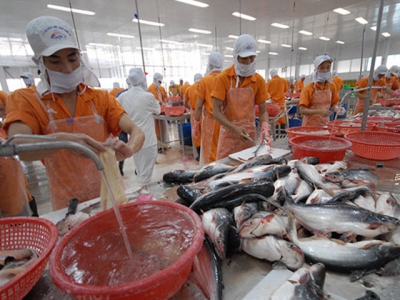Whether or not 15 Vietnamese seafood companies are banned to sell to China

VASEP’s representative says these 15 Vietnamese seafood companies do not satisfy export requirements imposed by China, because they already wound up, or due to other reasons.
The Undercurrent News has just posted the news related to China barring 15 Vietnamese seafood companies from selling to their country, following the suspend the import of shrimps from the two largest Ecuador companies.
Undercurrent News quoted the General Administration of Customs of the People’s Republic of China that two Vietnamese seafood companies, Agrifish and Tafishco, were not allowed to export their products to China. Besides them, 13 Vietnamese shrimp companies were added to this list.
Trương Đình Hòe, General Secretary of the Vietnam Association of Seafood Export and Producers (VASEP) said that it was a not sanction, but it was because those companies failed to meet China’s export requirements. Actually, they already committed to the dissolution or they exported just a small number of products in the previous years. There were at least two of those fifteen companies wound up, according to Vietnam General Department of Taxation.
Among those, Quốc Hải food processing factory of Quốc Hải NNT Limited Company has stopped since 17 September 2015 (but has not fulfilled its obligations of taxation) and Gành Hào seafood processing facility since December 2014. Phương Nam food processing joint stock company, which was once the biggest one, announced its bankruptcy in 2013.
Hoè said that Vietnam had sent China a list of more than 600 seafood companies for approval, those 15 ones included. China updated the list every year; therefore, the information about 15 companies being taken out of the list is not as serious as the news posted by international websites.
Có thể bạn quan tâm
 Alltech Coppens launches aquaculture inventor program
Alltech Coppens launches aquaculture inventor program Fish feed manufacturer, Alltech Coppens, says it is looking to discover and support ideas developed by fish farmers for fish farmers, with its new inventor
 Early detection the microsporidian parasite infecting shrimps
Early detection the microsporidian parasite infecting shrimps “The detection of the microsporidian Enterocytozoon hepatopenaei (EHP) infecting shrimp by the Realtime PCR technique” was highly evaluated
 Đồng Tháp to grant identification numbers for 100% of pangasius ponds
Đồng Tháp to grant identification numbers for 100% of pangasius ponds Pangasius farms are organized and managed under quality standards with identification numbers being granted to almost 100% of farming areas and 60% of ponds